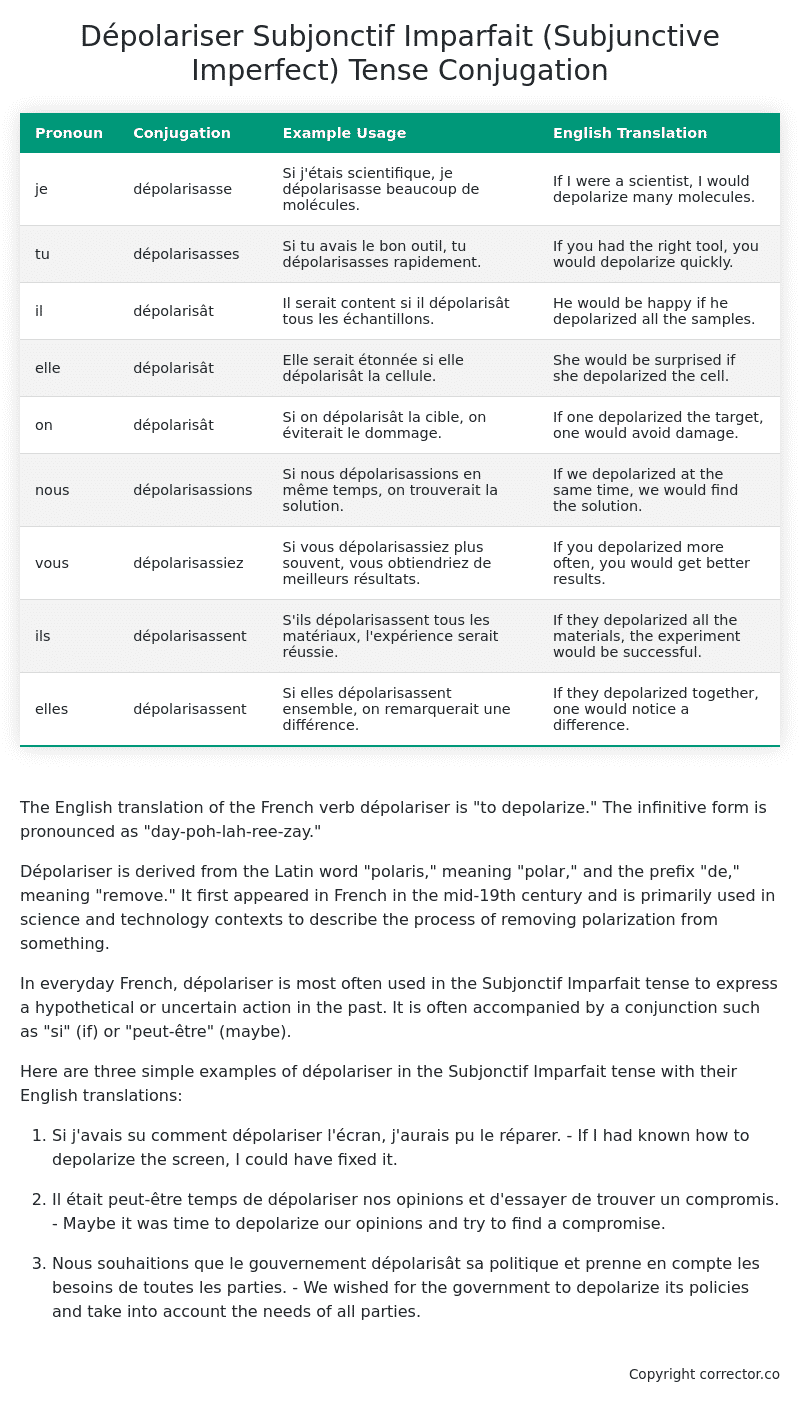Subjonctif Imparfait (Subjunctive Imperfect) Tense Conjugation of the French Verb dépolariser
Introduction to the verb dépolariser
The English translation of the French verb dépolariser is “to depolarize.” The infinitive form is pronounced as “day-poh-lah-ree-zay.”
Dépolariser is derived from the Latin word “polaris,” meaning “polar,” and the prefix “de,” meaning “remove.” It first appeared in French in the mid-19th century and is primarily used in science and technology contexts to describe the process of removing polarization from something.
In everyday French, dépolariser is most often used in the Subjonctif Imparfait tense to express a hypothetical or uncertain action in the past. It is often accompanied by a conjunction such as “si” (if) or “peut-être” (maybe).
Here are three simple examples of dépolariser in the Subjonctif Imparfait tense with their English translations:
-
Si j’avais su comment dépolariser l’écran, j’aurais pu le réparer. – If I had known how to depolarize the screen, I could have fixed it.
-
Il était peut-être temps de dépolariser nos opinions et d’essayer de trouver un compromis. – Maybe it was time to depolarize our opinions and try to find a compromise.
-
Nous souhaitions que le gouvernement dépolarisât sa politique et prenne en compte les besoins de toutes les parties. – We wished for the government to depolarize its policies and take into account the needs of all parties.
Table of the Subjonctif Imparfait (Subjunctive Imperfect) Tense Conjugation of dépolariser
| Pronoun | Conjugation | Example Usage | English Translation |
|---|---|---|---|
| je | dépolarisasse | Si j’étais scientifique, je dépolarisasse beaucoup de molécules. | If I were a scientist, I would depolarize many molecules. |
| tu | dépolarisasses | Si tu avais le bon outil, tu dépolarisasses rapidement. | If you had the right tool, you would depolarize quickly. |
| il | dépolarisât | Il serait content si il dépolarisât tous les échantillons. | He would be happy if he depolarized all the samples. |
| elle | dépolarisât | Elle serait étonnée si elle dépolarisât la cellule. | She would be surprised if she depolarized the cell. |
| on | dépolarisât | Si on dépolarisât la cible, on éviterait le dommage. | If one depolarized the target, one would avoid damage. |
| nous | dépolarisassions | Si nous dépolarisassions en même temps, on trouverait la solution. | If we depolarized at the same time, we would find the solution. |
| vous | dépolarisassiez | Si vous dépolarisassiez plus souvent, vous obtiendriez de meilleurs résultats. | If you depolarized more often, you would get better results. |
| ils | dépolarisassent | S’ils dépolarisassent tous les matériaux, l’expérience serait réussie. | If they depolarized all the materials, the experiment would be successful. |
| elles | dépolarisassent | Si elles dépolarisassent ensemble, on remarquerait une différence. | If they depolarized together, one would notice a difference. |
Other Conjugations for Dépolariser.
Le Present (Present Tense) Conjugation of the French Verb dépolariser
Imparfait (Imperfect) Tense Conjugation of the French Verb dépolariser
Passé Simple (Simple Past) Tense Conjugation of the French Verb dépolariser
Passé Composé (Present Perfect) Tense Conjugation of the French Verb dépolariser
Futur Simple (Simple Future) Tense Conjugation of the French Verb dépolariser
Futur Proche (Near Future) Tense Conjugation of the French Verb dépolariser
Plus-que-parfait (Pluperfect) Tense Conjugation of the French Verb dépolariser
Passé Antérieur (Past Anterior) Tense Conjugation of the French Verb dépolariser
Futur Antérieur (Future Anterior) Tense Conjugation of the French Verb dépolariser
Subjonctif Présent (Subjunctive Present) Tense Conjugation of the French Verb dépolariser
Subjonctif Passé (Subjunctive Past) Tense Conjugation of the French Verb dépolariser
Subjonctif Imparfait (Subjunctive Imperfect) Tense Conjugation of the French Verb dépolariser (this article)
Conditionnel Présent (Conditional Present) Tense Conjugation of the French Verb dépolariser
Conditionnel Passé (Conditional Past) Tense Conjugation of the French Verb dépolariser
L’impératif Présent (Imperative Present) Tense Conjugation of the French Verb dépolariser
L’infinitif Présent (Infinitive Present) Tense Conjugation of the French Verb dépolariser
Struggling with French verbs or the language in general? Why not use our free French Grammar Checker – no registration required!
Get a FREE Download Study Sheet of this Conjugation 🔥
Simply right click the image below, click “save image” and get your free reference for the dépolariser Subjonctif Imparfait tense conjugation!

Dépolariser – About the French Subjonctif Imparfait (Subjunctive Imperfect) Tense
Formation
Common Everyday Usage Patterns
Interactions with Other Tenses
Subjonctif Présent
Indicatif Passé Composé
Conditional
Conditional Perfect
Summary
I hope you enjoyed this article on the verb dépolariser. Still in a learning mood? Check out another TOTALLY random French verb conjugation!


